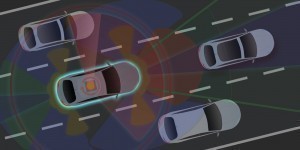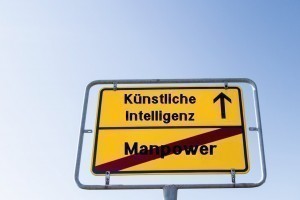The use of artificial intelligence (AI) is a prerequisite for the implementation of Industry 4.0-controlled production. Several institutes are now providing assistance to small and medium-sized enterprises in particular.
Artificial intelligence (AI) can be found in smartphones, search engines and navigation devices, making everyday life easier. There is also great potential for its use in engineering, such as in smart factories or autonomous vehicles. However, there is a lack of procedures that make the behavior of the systems predictable and their decisions comprehensible. The "Competence Center for AI Engineering" (CC-KING), led by the Fraunhofer Institute of Optronics, System Technologies and Image Exploitation IOSB with the participation of the Karlsruhe Institute of Technology (KIT) and the FZI Research Center for Information Technology, aims to remedy this situation.
Classic engineering is characterized by predictability: Developers already know in the design phase how the individual components and therefore the overall system will behave later on. Systems with artificial intelligence (AI) or machine learning (ML) components are not as predictable; they continue to develop during their runtime and only develop their final functionality during operation. This is a major challenge for the reliable control of exceptional situations - and the economic benefit is also almost impossible to quantify in advance. Without the calculability of traditional engineering, the use of intelligent systems is therefore difficult for companies.
The "Competence Center for AI Engineering" (CC-KING) combines the concentrated information technology and engineering expertise of the Karlsruhe location in order to decisively facilitate the use of AI in practice: The Fraunhofer Institute of Optronics, System Technologies and Image Exploitation IOSB, the FZI Research Center for Information Technology and the KIT are researching fundamental questions, practical methods and, last but not least, specific application problems in close contact with other companies.
Fundamental methodological issues
The (un)predictability of the behavior of learning systems is a central topic of AI engineering. "The aim of AI engineering is to make AI and ML usable in an engineering manner, comparable to classical engineering. It is a very young discipline that bridges the gap between basic AI research and engineering," says Professor Jürgen Beyerer, Scientific Director of the Competence Center, Institute Director of Fraunhofer IOSB and Professor at KIT. "In addition to predictability, researchers are also focusing on the safety of AI-based systems, the explainability of decisions and the integration of prior and expert knowledge into data-driven approaches." The aim is to develop a standard procedure model for AI engineering that makes AI technologies usable for large, heterogeneous teams.
 "As a technology region with a long tradition in both engineering and computer science, Karlsruhe offers optimal conditions for the competence center," emphasizes Beyerer. With the Baden-Württemberg Autonomous Driving Test Bed and the Karlsruhe Research Factory, which is currently under construction, there are also suitable real-world laboratories for the application fields of mobility and industrial production. "Under these conditions, AI engineering could become a unique selling point for German AI."
"As a technology region with a long tradition in both engineering and computer science, Karlsruhe offers optimal conditions for the competence center," emphasizes Beyerer. With the Baden-Württemberg Autonomous Driving Test Bed and the Karlsruhe Research Factory, which is currently under construction, there are also suitable real-world laboratories for the application fields of mobility and industrial production. "Under these conditions, AI engineering could become a unique selling point for German AI."
CC-KING is intended to enable small and medium-sized enterprises (SMEs) in particular to use AI components in a manageable way. "Even highly innovative SMEs often lack AI expertise. This gap is difficult to close because AI experts are rare and are generally not familiar with the typical application domains," says Beyerer. This is why CC-KING offers companies concrete support. Companies can take advantage of unbureaucratic QuickChecks or TransferChecks. An advice center and an AI engineering learning lab for training company employees are currently being set up.
Interested parties are already invited to contact the CC-KING coordination office based at Fraunhofer IOSB (at
Advice and learning lab for SMEs
 Smart home applications and future autonomous driving are completely unthinkable without artificial intelligence Photos: NicoElNino/stock.adobe.com, fotohansel/stock.adobe.comAs thelead consortium partner, Fraunhofer IOSB is contributing its broad information technology expertise in both industrial automation and control technology as well as in the fields of AI and ML to the competence center. "In particular, we have already developed a tool-supported process model for AI engineering in industrial production over the past three years as part of the Fraunhofer-internal lead project 'ML4P - Machine Learning for Production'," explains Dr. Julius Pfrommer, research group leader at the institute and technical-scientific director of CC-KING. "It allows us to apply AI processes in a predictable and repeatable manner. The AI algorithms are of central importance, but often only make up a fraction of the overall solution." One focus is on the deep integration of existing tools from the engineering disciplines with the AI processes. "This is the only way to ensure that AI also performs well in areas where little or no data and experience is available."
Smart home applications and future autonomous driving are completely unthinkable without artificial intelligence Photos: NicoElNino/stock.adobe.com, fotohansel/stock.adobe.comAs thelead consortium partner, Fraunhofer IOSB is contributing its broad information technology expertise in both industrial automation and control technology as well as in the fields of AI and ML to the competence center. "In particular, we have already developed a tool-supported process model for AI engineering in industrial production over the past three years as part of the Fraunhofer-internal lead project 'ML4P - Machine Learning for Production'," explains Dr. Julius Pfrommer, research group leader at the institute and technical-scientific director of CC-KING. "It allows us to apply AI processes in a predictable and repeatable manner. The AI algorithms are of central importance, but often only make up a fraction of the overall solution." One focus is on the deep integration of existing tools from the engineering disciplines with the AI processes. "This is the only way to ensure that AI also performs well in areas where little or no data and experience is available."
How do you implement AI?
As an ideal test environment for the use of AI in industrial production, the Fraunhofer-Gesellschaft is currently working with KIT to build the Karlsruhe Research Factory, which will begin operations in 2021.
Another research topic is the integration of AI processes and AI systems such as the Smart Data Innovation Lab (SDIL) with existing models, simulators and expert knowledge from the engineering disciplines. "We are developing methodological foundations and problem solutions for this at KIT," says Beigl. In addition, the KIT institutes contribute to the area of tools and components.
 Small and medium-sized production companies must also invest in AI if they want to remain competitive in the long term (Photo: pustelflower/stock.adobe.com)This includes, for example, the process model for AI engineering, assistance functions for knowledge acquisition and optimization of AI components or the application of AI and ML processes with limited resources. The FZI Research Center for Information Technology leads this work package as well as the "Mobility" application domain of the competence center. In addition, as an institution for practical knowledge and technology transfer, the FZI contributes its expertise in the field of mobility research and artificial intelligence, in particular embedded AI and AI methods. In order to research and demonstrate the AI processes to be implemented in the competence center, both the infrastructure of the Baden-Württemberg Autonomous Driving Test Field and the infrastructure of the FZI House of Living Labs can be used.
Small and medium-sized production companies must also invest in AI if they want to remain competitive in the long term (Photo: pustelflower/stock.adobe.com)This includes, for example, the process model for AI engineering, assistance functions for knowledge acquisition and optimization of AI components or the application of AI and ML processes with limited resources. The FZI Research Center for Information Technology leads this work package as well as the "Mobility" application domain of the competence center. In addition, as an institution for practical knowledge and technology transfer, the FZI contributes its expertise in the field of mobility research and artificial intelligence, in particular embedded AI and AI methods. In order to research and demonstrate the AI processes to be implemented in the competence center, both the infrastructure of the Baden-Württemberg Autonomous Driving Test Field and the infrastructure of the FZI House of Living Labs can be used.
Source: KIT


